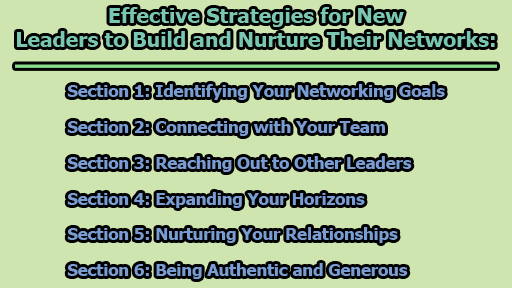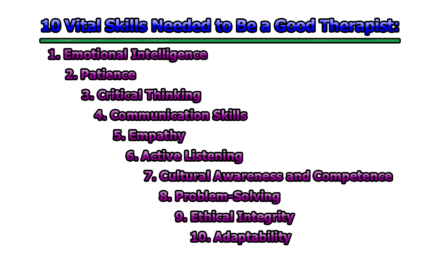Effective Strategies for New Leaders to Build and Nurture Their Networks:
Becoming a new leader can be a thrilling journey filled with opportunities, challenges, and responsibilities. However, it can also be a daunting and isolating experience. In order to thrive in your new role, building a strong and diverse network is essential. A well-developed network can offer support, valuable feedback, unique opportunities, and insights that can prove invaluable for your leadership journey. In this article, we will explore some effective strategies for new leaders to build and nurture their networks.
Section 1: Identifying Your Networking Goals:
Before embarking on your journey to build and nurture your network as a new leader, it’s crucial to start with a clear understanding of your networking goals. This initial step sets the direction for your efforts, helps you focus on what truly matters, and enables you to communicate your value effectively to potential connections.
1.1 Defining Your Networking Goals: As a new leader, your networking goals might encompass various aspects, including personal and professional development, enhancing your leadership skills, and achieving specific career objectives. To effectively define your networking goals, consider the following questions:
- What are your short-term and long-term career objectives?
- Do you want to learn new skills or gain new knowledge?
- Are you seeking mentorship or guidance from experienced professionals?
- Do you aim to expand your visibility in your organization or industry?
- Are you interested in exploring new career possibilities or industries?
Your networking goals should be specific, realistic, and tailored to your unique circumstances and aspirations. Once you have clarity on your objectives, you can proceed to the next steps of building and nurturing your network with a purpose.
Section 2: Connecting with Your Team:
2.1 Establishing Trust and Rapport: For new leaders, one of the most immediate and crucial networks is the team they lead. Building strong relationships with team members is not only essential for effective leadership but also contributes significantly to your overall network. Trust and rapport are foundational elements of these relationships. To establish trust and rapport within your team, consider the following strategies:
- Get to know your team members personally: Take the time to understand their backgrounds, interests, and aspirations. Show a genuine interest in their lives outside of work.
- Show empathy and understanding: Acknowledge their challenges and be supportive in helping them overcome obstacles.
- Provide recognition and feedback: Acknowledge their efforts and achievements, and offer constructive feedback when necessary.
- Lead by example: Demonstrate the qualities and behaviors you expect from your team, fostering a culture of respect and collaboration.
2.2 Fostering Collaboration: In addition to building individual relationships with your team members, it’s essential to foster collaboration among team members. A cohesive team can be a valuable source of support and problem-solving. Consider the following strategies to promote collaboration:
- Create opportunities for team-building activities: Organize team-building exercises and events that encourage team members to work together and build trust.
- Facilitate informal chats and peer learning sessions: Encourage team members to share their knowledge, experiences, and challenges with one another in informal settings.
- Establish an environment of open communication: Promote a culture where team members feel comfortable sharing ideas and discussing concerns.
A strong connection with your team is not only beneficial for your leadership within the organization but also an integral part of your broader network. Your team members can become important advocates and references as you progress in your career.
Section 3: Reaching Out to Other Leaders:
3.1 Leveraging the Expertise of Senior Leaders: In addition to your team, other leaders in your organization or industry can be invaluable sources of knowledge, guidance, and support. They have experience and insights that can help you navigate various aspects of leadership, from strategy and innovation to organizational culture and change management. To connect with senior leaders, consider the following strategies:
- Seek introductions: If you have colleagues or mentors who have relationships with senior leaders, ask for introductions.
- Join relevant groups or forums: Participate in professional organizations, industry groups, or online forums where senior leaders are active. Engage in discussions and contribute your insights.
- Attend events and workshops: Industry conferences, seminars, and leadership development programs are excellent opportunities to network with senior leaders.
- Offer assistance: Show your willingness to help senior leaders with their projects, research, or initiatives. This can be a great way to establish rapport.
3.2 Offering Your Insights and Collaborative Opportunities: Networking with other leaders should not be one-sided. You can also provide value to your network by sharing your insights and expertise. New leaders often bring fresh perspectives and ideas to the table, and offering these can be a compelling way to establish mutually beneficial relationships. Consider these strategies:
- Share your insights: Whether through articles, presentations, or informal discussions, offer your unique perspective on industry trends, challenges, and opportunities.
- Collaborate on initiatives: Propose collaborative projects or initiatives that align with the interests of other leaders in your network.
- Invite them to your initiatives: Extend invitations to senior leaders to participate in projects or events you are leading.
By actively engaging with senior leaders and demonstrating your willingness to contribute, you can build meaningful and mutually beneficial relationships.
Section 4: Expanding Your Horizons:
4.1 Embracing Diversity in Your Network: While networking within your industry and with professionals who share similar backgrounds and experiences is valuable, it’s essential to diversify your network. Diverse perspectives and backgrounds can introduce you to new opportunities and ideas that you might not have considered otherwise. To expand your network and embrace diversity, consider these strategies:
- Join cross-functional teams: Participate in projects or initiatives that involve colleagues from different departments or areas of expertise.
- Engage in community or social projects: Volunteering for community or social causes can introduce you to a diverse group of individuals who share common goals.
- Take online courses and attend webinars and podcasts: These platforms can connect you with professionals from various industries and backgrounds.
4.2 Learning from Different Perspectives: Diversifying your network is not only about meeting people with different backgrounds but also about learning from their experiences and insights. New leaders can gain valuable knowledge from diverse sources, which can be instrumental in their decision-making and problem-solving. To effectively learn from different perspectives, consider these strategies:
- Actively listen and ask questions: When engaging with individuals from diverse backgrounds, pay attention to their experiences and ask open-ended questions to gain a deeper understanding.
- Be open to new ideas: Approach conversations with an open mind, be willing to challenge your assumptions, and consider new approaches to problem-solving.
- Seek mentorship from individuals with diverse backgrounds: Having mentors from various backgrounds can provide you with a broader perspective on leadership.
Embracing diversity in your network can be a catalyst for innovation and personal growth, making you a more adaptable and effective leader.
Section 5: Nurturing Your Relationships:
5.1 Maintaining and Strengthening Connections: Building your network is not a one-time event but an ongoing process. To harness the full potential of your network, it’s essential to maintain and strengthen your connections over time. Neglecting your relationships can lead to missed opportunities and reduced effectiveness as a leader. To nurture your relationships effectively, consider the following strategies:
- Follow up: After initial meetings or collaborations, follow up with a personalized message or call to express your continued interest in the relationship.
- Keep in touch: Regularly check in with your network connections, share updates on your own progress, and inquire about their well-being and achievements.
- Add value: Find opportunities to offer support, share relevant resources, or provide assistance where you can.
5.2 Seeking Feedback, Advice, and Introductions: Networking is a two-way street, and it’s important to demonstrate your willingness to seek input and support from your connections. This not only shows your respect for their expertise but also strengthens your bonds. To effectively seek feedback, advice, and introductions, consider these strategies:
- Be specific in your requests: When seeking advice or feedback, articulate your needs clearly and concisely.
- Express gratitude: Always acknowledge and express your appreciation when someone provides you with valuable insights or assistance.
- Offer reciprocal support: Be open to reciprocating by sharing your expertise, providing assistance, or facilitating introductions when the opportunity arises.
Nurturing your relationships demonstrates your commitment to your network and fosters goodwill, which can be particularly beneficial when you require support or assistance.
Section 6: Being Authentic and Generous:
6.1 Authenticity in Networking: Authenticity is a fundamental principle in effective networking. New leaders should strive to be themselves, not only because it builds trust but also because it creates deeper, more meaningful connections. To be authentic in your networking, consider these strategies:
- Be genuine and sincere: Authenticity involves being honest, transparent, and true to your values.
- Show interest in others: Approach conversations with a genuine curiosity about the experiences, goals, and challenges of your network connections.
6.2 Generosity in Networking: Generosity is another key element of successful networking. Being generous with your time, knowledge, and resources can help you build a network that’s willing to support your growth as a leader. To be generous in your networking, consider these strategies:
- Offer assistance: When you see an opportunity to help someone in your network, whether it’s through mentorship, sharing resources, or making introductions, do so willingly.
- Share your knowledge: Be open to sharing your expertise, insights, and experiences with others.
- Help others achieve their goals: Actively support the objectives of your network connections, whether it’s by providing advice or leveraging your resources to assist them.
By being authentic and generous in your networking, you not only build trust and credibility but also create lasting and meaningful connections that can be instrumental in your journey as a new leader.
In conclusion, building and nurturing your network as a new leader is an essential part of your journey towards success. Your network can provide you with the support, guidance, and opportunities needed to excel in your leadership role. By implementing the strategies outlined in this comprehensive guide, you can navigate the challenges of leadership with confidence and competence. Networking is not just about what you can gain but also about what you can contribute to others in your network, resulting in a mutually beneficial and rewarding experience. Remember that building your network is an ongoing process, and the connections you establish can prove to be invaluable assets throughout your career.

Library Lecturer at Nurul Amin Degree College










